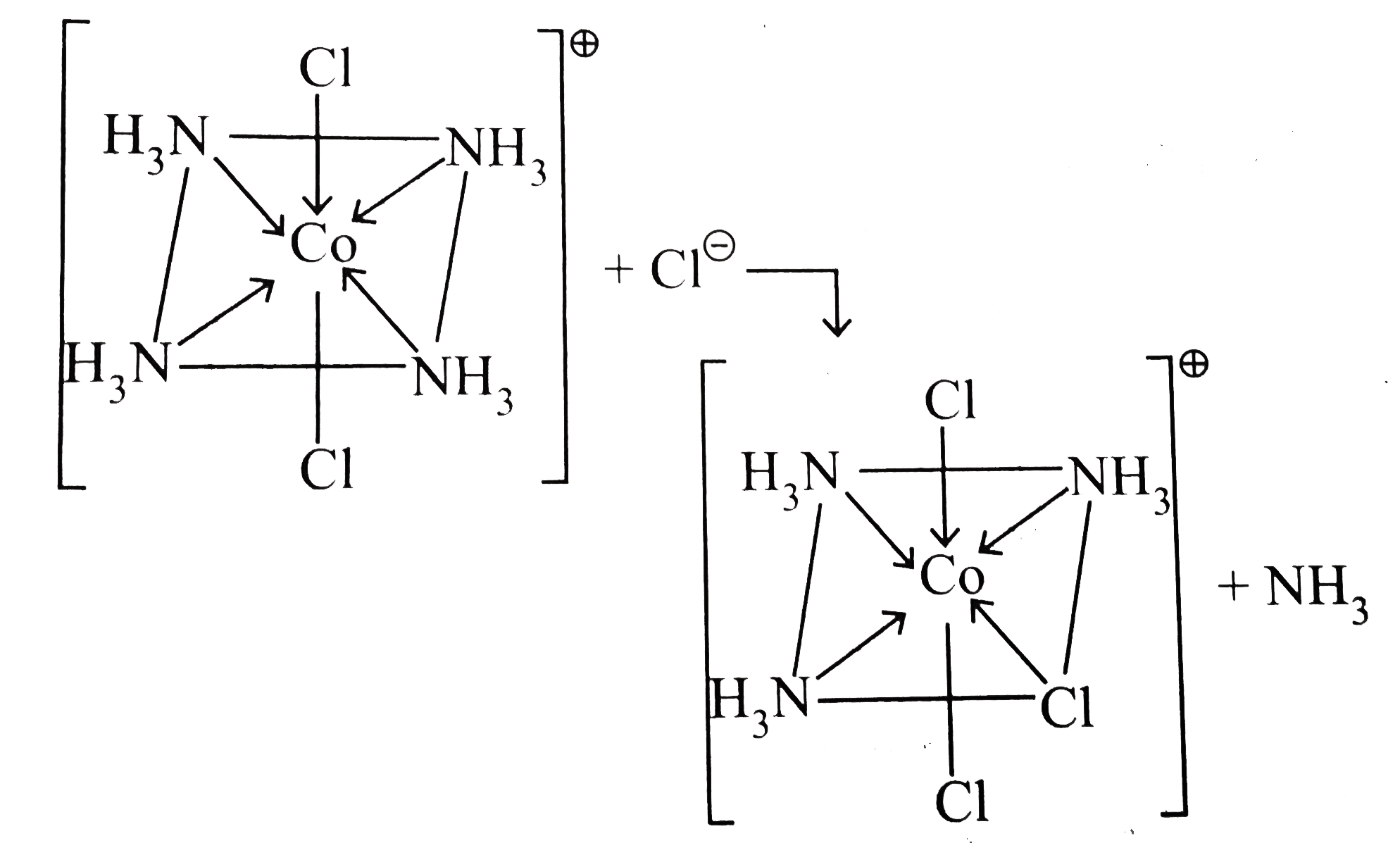In the reaction
[CoCI2(NH3)4]⊕→[CoCI3(NH3)3]+NH3, only one
isomer of the complex product is obtained Is the initial complex cis or trans ? .
In the original complex two CIΘ ions are present in the trans position so that all four NH3 molecules are equivalent and replacement of any one of them gives same product
 .
.
Topper's Solved these Questions
- COORDINATION COMPOUNDSBOOK - CENGAGE CHEMISTRYCHAPTER - COORDINATION COMPOUNDSEXERCISE - Solved Examples
42 Videos
- COORDINATION COMPOUNDSBOOK - CENGAGE CHEMISTRYCHAPTER - COORDINATION COMPOUNDSEXERCISE - Ex 7.1 Subjective (Terminology)
5 Videos
- CHEMICAL KINETICSBOOK - CENGAGE CHEMISTRYCHAPTER - CHEMICAL KINETICSEXERCISE - Archives Subjective
23 Videos
- D AND F BLOCK ELEMENTSBOOK - CENGAGE CHEMISTRYCHAPTER - D AND F BLOCK ELEMENTSEXERCISE - Archives Subjective
29 Videos
Similar Questions
Statement-1: In the reaction [CoCl2(NH3)4]++Cl−→[CoCl3(NH3)3]+NH3, when reactant is in cis-form two isomers of the product are obtained.
Statement-2: Third chloride ions replaces an ammonia cis to both chloride ion or trans to one of the chloride ion.
View Solution[CoCl2(NH3)4]++Cl−→[CoCl3(NH3)3]+NH3 If in the above reaction only one isomer of the product is obtained, which is true for the initial (reactant) complex :
View Solution
Knowledge Check
Four statements for the following reaction given below [CoCl2(NH3)4]+→[CoCl3(NH3)3]+NH3
(P) Only one isomer is produced if the ractant complex ion is a trans isomer
(Q) Three isomers are produced if the reactant complex ion is a cis isomer
(R ) Two isomers are produced if the reactant complex ion is trans isomer
(S) Two isomers are produced if the reactant complex is cis isomer
The correct statements are :AP and QBR and SCP and SDQ and RFour statements for the following reaction given below [CoCl2(NH3)4]+→[CoCl3(NH3)3]+NH3
(P) Only one isomer is produced if the ractant complex ion is a trans isomer
(Q) Three isomers are produced if the reactant complex ion is a cis isomer
(R ) Two isomers are produced if the reactant complex ion is trans isomer
(S) Two isomers are produced if the reactant complex is cis isomer
The correct statements are :AP and QBR and SCP and SDQ and RStatement-1: In the reaction [CoCl2(NH3)4]++Cl−→[CoCl3(NH3)3]+NH3, when reactant is in cis-form two isomers of the product are obtained.
Statement-2: Third chloride ions replaces an ammonia cis to both chloride ion or trans to one of the chloride ion.AStatement-1 is True, Statement-2 is True , Statement-2 is a correct explanation for Statement-1.BStatement-1 is True, Statement-2 is True, Statement-2 is NOT a correct explanation for Statement-1.CStatement-1 is True, Statement-2 is False.DStatement-1 is False, Statement-2 is True.
[CoCl2(NH3)4]++Cl−→[CoCl3(NH3)3]+NH3. If in this reaction two isomers of the produt are obtained, which is true for the iniital (reactant) complex:
View Solution[CoCl2(NH3)4]++Cl−→[CoCl3(NH3)3]+NH3. If in this reaction two isomers of the produt are obtained, which is true for the iniital (reactant) complex:
View SolutionThe complex ion [Cu(NH3)4]2+ is
View SolutionThe complex ion [Cu(NH3)4]2+ is
View SolutionConsider the following reaction and statements:
[Co(NH3)4Br2]++Br−→[Co(NH3)3Br3]+NH3
Two isomers are produced if the reactant complex ion is a cis-isomer
Two isomers are produced if the reactant complex ion is a trans-isomer
Only one isomer is produced if the reactant complex ion is a trans-isomer
Only one isomer is produced if the reactant complex ion is a cis – isomer
The correct statements are
View Solution
